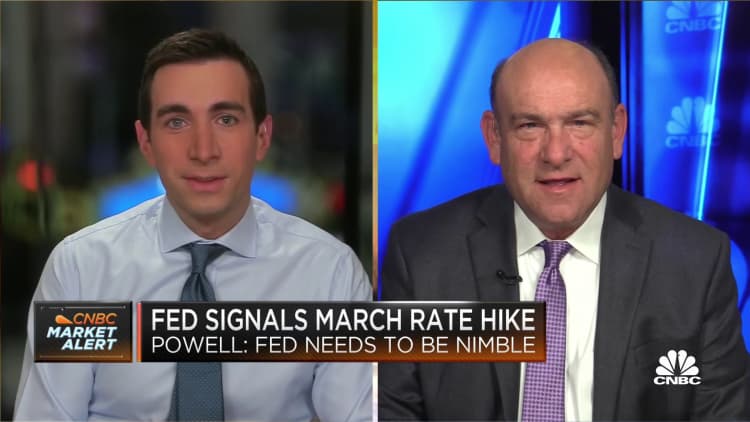The specter of rising interest rates is spooking the stock market.
The Federal Reserve, the U.S. central bank, is expected to increase its benchmark rate several times this year to tame stubbornly high inflation. Fed chair Jerome Powell affirmed that likelihood on Wednesday.
The move would increase borrowing costs from near zero — where they've been since the beginning of the Covid pandemic — for businesses and consumers.
The forecast has caused stocks to nosedive in January.
The S&P 500 index is down about 9% for the year. At one point this week, the basket of U.S. stocks dipped below 10% — the first time that's happened since the initial pandemic turmoil of March 2020. The index closed down 0.2% Wednesday after Powell's remarks, erasing earlier gains.
Cooler economy
Why does the stock market care?
Broadly, the reasons seem to be twofold: A slowdown of the U.S. economy and the prospect of other investments like bonds becoming more attractive relative to stocks.
When the Fed raises its benchmark interest rate, banks and lenders tend to raise borrowing costs, too. Mortgages, credit cards and other debt become pricier, reducing consumer spending and demand. Businesses also pay more to finance their operations.
More from Personal Finance:
What the Fed's plan to raise interest rates means for you
Why new parents may qualify for another $1,400 stimulus check
3 reasons to keep your will or estate plan updated
Broadly, this dampens the outlook for company profits and reduces investor enthusiasm for buying their stock.
"A tightening of monetary policy will put pressure on economic activity," according to Blair duQuesnay, a certified financial planner and investment advisor at Ritholtz Wealth Management, who is based in New Orleans. "And it's by design."
Too far, too fast?
The Fed's "design" is to cool off inflation. Consumer prices jumped 7% in December from a year earlier, the fastest pace since 1982.
But the stock market isn't reacting just to a likely rate bump; stock gyrations have as much to do with uncertainty over how fast the Fed will accelerate.
"What the market doesn't like, is rapid changes in the monetary landscape," according to David Stubbs, the global head of cross-asset thematic strategy at J.P. Morgan Private Bank.

When inflation began accelerating in early 2021, Fed officials signaled it was likely temporary, the short-term result of a hyperactive economy emerging from its pandemic hibernation.
Now, their tone has shifted as inflation has lingered well above the Fed's 2% long-run target. In large part, that seems due to consumer demand for physical goods outstripping supply, as Covid continues to disrupt manufacturers.
"Since the December meeting, I would say that the inflation situation is about the same but probably slightly worse," Powell said Wednesday. "I think to the extent the situation deteriorates further, our policy will have to address that," he added.
Investors worry an aggressive Fed response may slam the brakes on the economy — though Powell has sought to reassure the policy response will be "nimble."
Anxiety over that outcome is the main reason for market jitters, according to CFP Lee Baker, founder of Apex Financial Services in Atlanta.
"What are the trickle-down effects if the Fed raises rates too far, too fast? If it slows down the economy, what does that do to [company] earnings? You just sort of follow that domino," Baker said. "If you're talking about earnings, you're talking about stocks."
(This discussion is relative to a broad basket of U.S. stocks. It's not true that all companies necessarily suffer if rates rise. Some may do better — like a bank, for example, that charges more to lend.)
Stocks lose luster
If rates rise, investors may see more value in bonds, certificates of deposit and other assets thought to be less risky than stocks.
Yields in those conservative assets have been relatively paltry since the 2008 financial crisis, which led to a prolonged period of rock-bottom interest rates to spur the economy.
Maybe [stocks] should sell off despite anything else.Blair duQuesnayCFP and investment advisor at Ritholtz Wealth Management
Investors looking for returns were essentially "forced" into stocks, Baker said.
The value proposition may change, if bond yields and CD rates move upward in tandem with the Fed's benchmark rate.
Other factors
Though it seems to play the biggest role, Fed policy isn't the only thing putting investors on edge.
For one, there's the prospect of war between Ukraine and Russia. Those geopolitical tensions fuel more uncertainty — for example, how might the energy sector be impacted if fighting breaks out?
The stock selloff may be a good thing, independent of what's causing it, duQuesnay said. The Federal Reserve is discussing higher interest rates because the economy and labor markets are strong; a reduction in stock prices may also tether lofty company valuations more to reality, she said.
"If you take away all the outside news and information about the stock market, it's gone up double digits for three years in a row," according to duQuesnay. "Maybe it should sell off despite anything else."



